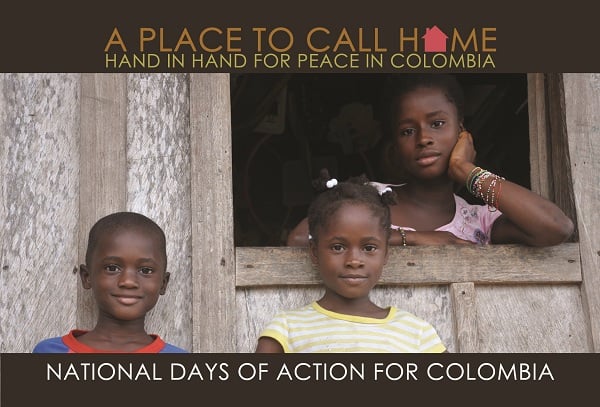
National Days of Action for Colombia brings US citizens together with Colombian organizations to advocate for US policies that promote human rights and humanitarian efforts in Colombia. To learn more visit www.lawg.org
World Refugee Day gives us a chance to reflect on the refugees closer to home, including thousands of Colombian refugees living throughout the Western Hemisphere. And the opportunity to understand what is driving them out of Colombia.
The United Nations High Commissioner for Refugees (UNHCR) reports today that there are officially 400,000 Colombian refugees living abroad. The vast majority reside in Ecuador, followed by the United States, Costa Rica, Venezuela, and Panama. The UNHCR´s spokesperson for the Andean Region, Francesca Fontanini reports; however, that the unofficial numbers are estimated to be much higher.
For many Colombian refugees, the first stage in their arduous journey abroad is internal displacement. The Colombian government reports that there are four million internally displaced people (IDPs) in Colombia, and NGO numbers, such as those from the Bogotá-based Consultoria para los Derechos Humanos y el Desplazamiento (Codhes), show five million IDPs living in the country. According to Fontanini,¨This [internal] displacement makes Colombia a protagonist in one of the gravest humanitarian crisis in the world, along with Sudan…¨
The UNHCR reports today that it is violence, and threats, pushing most Colombians over international borders to seek safety. The agency notes that a new phenomenon is occurring among Colombian refugees–they are no longer staying just on the other side of international borders, as was the case for years in Ecuador, but are seeking protection and opportunities in cities across the countries in which they arrive. The UNHCR explains that, in the case of countries immediately surrounding Colombia, refugees move farther away because they do not feel safe near Colombia’s borders where armed groups operate and often continue to threaten them. In addition, notes Fontini, this phenomenon shows that refugees “do not believe the situation in Colombia will improve or, because they have suffered such a traumatic experience there, that they do not want to return.”
The UNHCR explains that the numbers of Colombian refugees and IDPs are a manifestation of a Colombian conflict that has not subsided, ¨It does not appear that the great flow of refugees and forcibly displaced [Colombians] is halting, and this is because they are moving in accordance with the dynamics of Colombia’s armed conflict.¨
Noting the existence of armed conflict in this context may seem redundant, yet it is important to state. For years former Colombian President Alvaro Uribe advanced policies and programs under a post-conflict logic. Asserting military victories across the country and implementing a demobilization of paramilitary forces, Uribe urged the world to see Colombia as having moved beyond war. And the US Administration has followed the same train of thought, often minimizing response to the nation´s humanitarian crisis, especially support for refugees.
An important example is funding for the US Bureau of Population, Refugees, and Migration (PRM). In each of the last five years, the US Administration has proposed disproportionally deep cuts to PRM´s budget for refugees in the Western Hemisphere—mostly Colombians. While strong advocacy and important Congressional leadership has fought to restore most of these funds, all signs indicate they will continue to face cuts in years ahead. This is largely because the US Administration underestimates the Colombian conflict and the humanitarian crisis it generates.
With little support from other nations, governments such as Ecuador’s rely heavily on the US to assist refugees. Each time US funds are cut, even slightly, Colombian refugees suffer significantly as projects established to meet their most basic needs are reduced, if not eliminated.
In the last year, after a decade of relatively hospitable reception to Colombian refugees, Ecuador started placing onerous restrictions on Colombians fleeing their country’s conflict. This is a response to shrinking funds from the international community and the Ecuadorian perspective that refugee flows from Colombia will not subside anytime soon.
Shaina Aber, Associate Advocacy Director at Jesuit Refugee Service USA explains, “US support does not cover the enormous needs of Colombian refugees in the Western Hemisphere. And we are therefore seeing the collapse of hospitable environments in the region, and worsening human rights conditions facing Colombian refugees.”
The constant threat of deep cuts to US funds for Colombian refugees, and the reductions which have taken place over the last five years, leave Colombian refugees even more vulnerable.
And while Colombian President Santos acknowledges the continuation of conflict in Colombia, his country´s response to the refugee crisis remains inadequate. Aber notes, ¨Not only is it important to recognize that conflict exists, and that it creates refugees, but that this is a historic moment in Colombia and without proper funding we may be missing an opportunity to support lasting solutions for Colombian refugees.¨
Today, World Refugee Day, it is important for US policy-makers to take note of the Western Hemisphere’s significant refugee crisis. Yet it may be even more important to acknowledge that Colombia’s armed conflict continues, and is the driving force of displacement in the Americas. And while it is critical to continue funding humanitarian responses to Colombia’s refugee and IDP crisis, policies and funds aimed at a negotiated solution to Colombia’s conflict are the only things that will bring true and lasting solutions to Colombian refugees.

Shaina Aber of Jesuit Refugee Services USA and Andrea Lari of Refugees International. For the last five years advocates in Washington, DC have fought hard to protect US funds that provide relief and protection for Colombian refugees.
(Photo Credits: www.lawg.org and Jesuit Refugee Services USA)